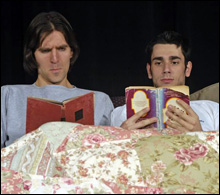 Not everyone is an inveterate theatergoer, so many of you have not seen the most celebrated play of the last decade and a half. For anyone who missed out or wants to see it again, Angels in America: Part One (Millennium Approaches) is getting a respectably accomplished staging by URI Theatre (through April 29).
Not everyone is an inveterate theatergoer, so many of you have not seen the most celebrated play of the last decade and a half. For anyone who missed out or wants to see it again, Angels in America: Part One (Millennium Approaches) is getting a respectably accomplished staging by URI Theatre (through April 29).
The full title of Tony Kushner’s entire seven-hour play is Angels in America: A Gay Fantasia on National Themes. The first part stands on its own pretty well, certainly fulfilling both components of that subtitle. As someone who was an undergraduate when naughty words on stage were actually an issue in college productions, it’s refreshing to see one in which gay sex is depicted directly. (Director Bryna Wortman doesn’t insult us by having an encounter in Central Park take place in the bushes, with sound effects only. Brief full back-al nudity — during a medical examination — prompted a gasp and titters from an older audience member near me, but no Bible-thumping hissy fit.)
Fascinatingly, Kushner manages to weave many strands in this tapestry of end-of-millennium America without tying the plot in knots. He takes us from death at the opening to affirmation at the end — in the form of a full-fledged angel descending to herald the coming millennium — binding multiple narratives with their commonality of hope.
In an odd ante-climax that somehow works, the play begins with a lengthy monologue by a rabbi (Ahmed Bharoocha). At the funeral of an old woman he never knew, he praises not so much her as the immigrant diaspora to America that she represents.
This concern for socio-historical context also comes up with an unhappy couple we meet who are Mormons, that only-in-America religion of optimistic seeking, as well as the angel Moroni. The torment of devout Joe Pitt (Ryan Romanowski) over secretly being gay — not actively so — is no help to his pill-popping wife Harper (Gillienne Nadeau). She has developed a rich, Valium-fueled fantasy life to compensate for deep unhappiness.
ADVERTISEMENT
 |
The other main story is that of Louis Ironson (Jordan Eastwood) and his lover Prior Walter (Jed Hancock-Brainerd), who has AIDS. It was Louis’s grandmother whose funeral elegy we heard, as preamble. Being Jewish, Louis is wracked with guilt at never having visited her in a nursing home, and being a modern New Yorker, he’s gifted at lamenting his selfishness instead of just knocking it off. That talent comes into play again when Prior gets sick and Louis knows that, despite loving him, he is going to abandon him.
As compelling as those people can be, there is a secondary character that threatens to take over the play and overwhelm everyone else with his outsized presence. Kushner got fascinated by his arch-villain version of Roy Cohn (Joe Short), lawyer and acolyte to Sen. Joe McCarthy, like Dante got into Satan. Gay and Jewish, homophobic and anti-Semetic, he’s presented fully by Short as written, with unapologetic feral joy.
Cohn wants lawyer Joe Pitt to serve as his mole in the Nixon Justice Department. Kushner is not at his most plausible when he has Joe with his Boy Scout ideals not repulsed by Cohn’s widow-robbing ways. But Romanowski plays him with such intense will that we can believe his self-delusion. Joe’s wife Harper is in pain as acute as his, it just presents itself more entertainingly. For example, she has her imaginary travel agent, Mr. Lies (Seth Finkle), take her to Antarctica, where she fantasizes giving birth to a white-furred baby and nursing him with cocoa streaming from her breasts. Nadeau’s Harper has a little-girl frailty, yet she conveys the backbone necessary for her to step out of an amiable but sexless marriage.
All the primary roles are reasonably well performed by these young actors. One secondary and some incidental parts are done surprisingly well. As Belize, a black drag queen and male nurse, Carlos Campbell goes beyond the campy opportunity to fill out an intelligent person we can admire. As a psychotic street person asked for directions in the South Bronx, Leah Kolb shocks and de¬lights with her few lines of irate hu¬manity. Patrick Bosworth struck me as especially convincing, playing a medieval ancestor of Prior.
This production of Part One doesn’t pack the multiple wallops that professionally-acted stagings have, but it ably conveys the gist of the play. I, for one, would love to see them follow up with Part Two.